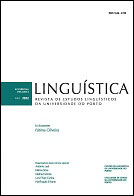O eterno caso dos adjetivos temporais e aspetuais um contributo para a sua caracterização semântica
Resumo
O objetivo deste artigo é a análise do comportamento semântico de adjetivos que, na literatura, têm sido designados de temporais e aspetuais, no que diz respeito às leituras que podem ter. Para este efeito, foram selecionados dezasseis destes adjetivos e analisadas cinquenta ocorrências de cada um deles, escolhidas de forma aleatória, no corpusCETEMPúblico. Em termos gerais, verificou-se uma significativa diversidade de leituras em todos os adjetivos considerados, os quais, em maior ou menor grau, são capazes de expressar valores temporais, aspetuais, temporoaspetuais, evidenciando ainda leituras próprias de adjetivos qualificativos e relacionais. Esta diversidade de leituras possíveis levanta problemas a propostas que pretendam catalogar de forma estática (i.e., sem considerar o contexto) este grupo de adjetivos.
Referências
Balogh, P. (2006). Vers une typologie des adjectifs temporels. Linguistica e Investigaciones,29(2), 195-217.
Borillo, A. (2001). Quelques adjectifs de référence temporelle du français. Cahiers de Grammaire, 26, 37-53.
Cunha, L. F. (2006a). Iteração, Frequência e Habitualidade: Algumas Reflexões. Actas del VII Congrès de Lingüística General, Barcelona. Departement de Lingüística General.
Cunha, L. F. (2006b). Frequência vs. Habitualidade: Distinções e Convergências. Milka Villayandre Llamazares (Ed.), Actas del XXXV Simpósio Internacional de la Sociedad Española de Lingüística (pp. 333-357). Universidad de León. Sociedad Española de Lingüística.
Cunha, L. F. (2013). Aspeto. In E. B. P. Raposo, M. F. B. do Nascimento, M. A. C. da Mota, L. Segura, & A. Mendes (Orgs.), Gramática do Português (Vol. 1, pp. 585-619). Fundação Calouste Gulbenkian.
Demonte, V. (1999). El adjetivo: Clases y Usos. La Posición del Adjetivo en el Sintagma Nominal. In I. Bosque, & V. Demonte (Orgs.), Gramática descriptiva de la lengua española (Vol. 1, Cap. 3, pp. 129-215). Espasa Calpe.
Ferreira, I. (2013). Para o estudo semântico dos adjetivos temporais e aspetuais doPortuguês Europeu [Tese de Doutoramento]. Universidade do Porto.
Fiorin, J. L. (2003). Adjetivos Temporais e Espaciais. In M. B. M. Abaurre, & Â. C. S. Rodrigues (Eds.), Gramática do Português Falado: Novos Estudos Descritivos (Vol. 8, pp. 59-81). Editora Unicamp.
Gross, G. (1996). Prédicats nominaux et compatibilité aspectuelle. Langages, 121, 54- 72.
Gross, M. (1986). Grammaire Transformationnelle du Français. Syntaxe des Adverbes. Asstril.
Ilari, R., Oliveira, F., & Basso, R. M. (2016). Tense and Aspect. A survey. In W. L. Wetzels, J. Costa, & S. Menuzzi (Eds.), The Handbook of Portuguese Linguistics (pp. 392-407).Blackwell.
Mascherin, L. (2007). Analyse morphosémantique de l’aspectuo-temporalité en français: le cas du préfixe RE- [Tese de Doutoramento]. Université de Nancy 2.
Oliveira, F. (1991). Alguns aspectos do aspecto. Actas do VII Encontro Nacional da Associação Portuguesa de Linguística (pp. 288-303). APL.
Oliveira, F. (2003). Tempo e Aspecto. In M. H. M. Mateus, A. M. Brito, I. Duarte, I. H. Faria, S. Frota, G. Matos, F. Oliveira, M. Vigário, & A. Villalva (Eds.), Gramática da Língua Portuguesa (Cap. 6, pp. 127-178). Caminho.
Oliveira, F. (2013). Tempo Verbal. In E. B. P. Raposo, M. F. B. do Nascimento, M. A. C. da Mota, L. Segura, & A. Mendes (Orgs.), Gramática do Português (Vol. 1, pp. 509-556). Fundação Calouste Gulbenkian.
Schäfer, R. (2007). On Frequency Adjectives. In L. McNally, & E. Puig-Waldmüller (Eds.), Proceedings of Sinn und Bedeutung (Vol. 11, pp. 555-567). Universitat Pompeu Fabra.
Veloso, R., & Raposo, E. (2013). Adjetivo e Sintagma Adjetival. In E. B. P. Raposo, M. F. B. do Nascimento, M. A. C. da Mota, L. Segura, & A. Mendes (Orgs.), Gramática do Português (Vol. 2, pp. 1359-1489). Fundação Calouste Gulbenkian.
Downloads
Publicado
Edição
Secção
Licença
Direitos de Autor (c) 2022 Linguística: Revista de Estudos Linguísticos da Universidade do Porto

Este trabalho encontra-se publicado com a Creative Commons Atribuição-NãoComercial 4.0.



